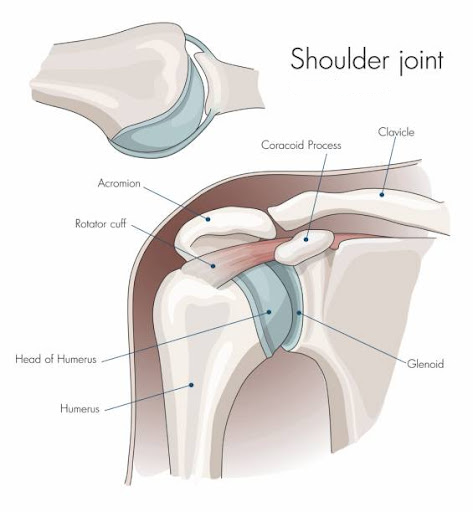The Centers for Advanced Orthopaedics is redefining the way musculoskeletal care is delivered across the region with locations throughout Maryland, DC, Virginia and Pennsylvania.
REGENETEN Bioinductive Implant as a Treatment for Shoulder Pain
Shoulder Anatomy

The shoulder primarily consists of a ball-and-socket joint (i.e. glenohumeral joint), as the head of the shoulder’s humerus is shaped like a ball. This ball fits into the shoulder blade, which acts as a socket.
Within the shoulder, the rotator cuff muscle sits in between the glenohumeral joint and the Acromion. Finally, the shoulder’s bursa (fluid-filled cushion), sits right above the rotator cuff muscle.
The rotator cuff muscle consists of four muscles and tendons that surround the shoulder joint, providing stability and movement to the shoulder. When one or more of these tendons are torn, it can cause pain, weakness, and limited mobility in the shoulder. Rotator cuff tears are a common injury, particularly in people over the age of 40. Treatment options for partial rotator cuff tears range from conservative measures such as physical therapy to surgical intervention. One promising surgical option is the use of the REGENETEN Bioinductive Implant.
What are the Common Causes of Shoulder Pain?
Typically, shoulder pain only affects a small area and lasts a relatively short time. The primary causes for shoulder pain include bursal inflammation, tendon/muscle damage, muscle tension between the shoulder and neck, and/or bone & cartilage damage (i.e. arthritis).
What are the Treatment Options for Shoulder Pain?
Shoulder pain can be treated with over-the-counter (OTC) anti-inflammatory medications, such as Aleve or Advil, and activity modification. If OTC medications are ineffective, prescription anti-inflammatory medications (NSAIDs), such as Diclofenac or Meloxicam, can be offered as a solution. Physical therapy can also be utilized to alleviate shoulder pain. In addition, corticosteroid injections can be used to directly target the inflammation within the shoulder and provide long-term resolution.
If shoulder pain continues to persist after exhausting the above treatment options, arthroscopic management can be used as a viable treatment option.
What Causes Shoulder Pain to Persist?
If non-invasive treatment options, such as medications, physical therapy, and/or corticosteroid injections do not resolve shoulder pain, invasive options may be used to offer long term benefit.
The rotator cuff muscle within the shoulder is one of the primary factors for persistent shoulder pain. At times, partial or full tears of the rotator cuff may cause acute or chronic shoulder pain. Although non-invasive treatment options can provide long term relief for partial rotator cuff tears, further intervention may be required if those treatment options are ineffective.
REGENETEN Bioinductive Implant
At times, the rotator cuff muscle can be a cause for persistent shoulder pain. This shoulder pain can be attributed to partial or complete tears of the rotator cuff muscle.
Traditional interventional repair procedures for treating rotator cuff disease would involve suturing tendons to bone. This process is associated with long term rehabilitation and lifestyle disruptions. Thus, individuals would forgo rotator cuff repairs until pain became more severe and disruptive to ADL. However, as rotator cuff disease progresses, it can increase the size of the tear, making it more difficult for your surgeon to repair it.
The REGENETEN Bioinductive implant provides an innovative and minimally invasive approach to treating rotator cuff pathology. For partial or focal complete rotator cuff tears, the REGENETEN bioinductive implant uses the body’s natural healing process to allow the rotator cuff muscle and tendon to heal
In most cases, with partial rotator cuff tears, the supraspinatus (SST) muscle in the rotator cuff is typically affected. The REGENETEN Bioinductive Implant is a device designed to promote the healing of partial rotator cuff tears. It is made of a proprietary blend of biocompatible polymers and, arthroscopically, is placed directly onto the supraspinatus (SST) partial rotator cuff tear. The implant works by stimulating the body's natural healing process, encouraging the growth of new tissue to bridge the gap created by the tear.
One of the advantages of the REGENETEN Bioinductive Implant is that it can be used in conjunction with other surgical techniques. For example, if a patient has a partial rotator cuff tear that is accompanied by a bone spur or other structural abnormality, the surgeon may perform additional procedures, such as debridement, acromioplasty, and distal clavicle excision, to address those issues while also using the implant to promote healing of the tendon tear.
Clinical studies have shown promising results for the use of the REGENETEN Bioinductive Implant in treating partial rotator cuff tears. In a randomized controlled trial published in the Journal of Shoulder and Elbow Surgery in 2018, patients who received the implant had significantly better outcomes than those who underwent traditional surgical repair alone. Specifically, the implant group had higher rates of tendon healing and improved shoulder function.
One of the benefits of the REGENETEN Bioinductive Implant is that it is minimally invasive, meaning that patients generally experience less pain and a shorter recovery time than with traditional surgical repair.
Additionally, because the implant works by promoting the body's natural healing process, there is less risk of adverse reactions or complications compared to synthetic materials or other treatments.
In summary, the REGENETEN Bioinductive Implant is a promising new treatment option for patients with partial rotator cuff tears. While further research is needed to fully understand its effectiveness and long-term outcomes, early results suggest that the implant can promote healing and improve shoulder function in patients with this common injury. If you are considering treatment for a partial rotator cuff tear, give us a call today to schedule an appointment!
Shaheer Yousaf, M.D., FACS